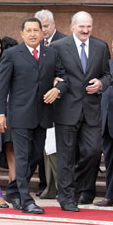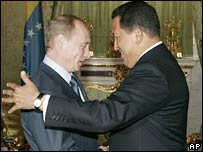Naoricide
This piece ran yesterday in
El Nuevo Herald, which is the
Miami Herald's Spanish language sister paper. Thanks to reader mike for translating...
Chávez’s Favorite Pollster Passes Itself Off as American
by Gerardo Reyes
When high ranking members of the administration in Venezuela cite the North American Opinion Research (NAOR) polling firm, Hugo Chávez's favorite, they note with a certain pride that the firm is from the United States, which apparently gives it an aura of independence and seriousness.
However, at the address that appears registered as the headquarters of NAOR in the United States, in southeast Miami, there's an accountant’s office and they haven’t even heard of the company.
At the time it was entered into the corporate registry in Florida in March of 2004, at this address –1549 NE 123 St.—there was a health clinic operating there, according to the receptionist of the locale where the Certified Public Accountants’ office is now found.
One of the accountants, who identified himself as Jacobo Nae, told El Nuevo Herald that he has no idea what NAOR is, although he did say that one of he functions of his firm is to create dozens of companies each month.
El Nuevo Herald was able to verify last Friday that at the office on 1549 NE 123 ST in Miami, listed as the company's main address, there are no analysts, statisticians, pollsters, nor polls. There were only clients waiting for help filing their tax.
The company has been questioned in Venezuela for what its critics consider a clear tendency to favor the government and for results inconsistent with major pollsters.
Carlos Sánchez, director of operations and spokesman for NAOR in Caracas, told El Nuevo Herald that he was not aware that the headquarters of the firm in the United States is an accountants’ office.
“I manage the part of Latin America,” said Sánchez. “I cannot answer for the United States.”
On Thursday, Sánchez offered to put one of our reporters in touch with the administrators of the company in the United States, but El Nuevo Herald received no call regarding the matter.
According to the corporate registries of Florida, the president of NAOR is Alirio Valbuena and the secretary of the company is Kaysa Makarem. According to several articles published in the press, Sánchez, President Chávez and other members of the Venezuelan government emphasize that “it is a North American company” when they want to highlight its independence.
In Peru, the firm also has made public controversial polls favoring nationalist presidential candidate Ollanta Humala, an admirer of Chávez.
This is not the first that that the seriousness and independence of the company has been placed in doubt. Academic investigators from the Central University of Venezuela and British reporter Aleksander Boyd have asked similar questions.
Recently, Boyd found that in the same offices where NAOR operates in Miami and in Caracas, the headquarters of Petrotulsa can also be found. Petrotulsa has been favored by state-owned PDVSA with contracts and projects.
On its website, Petrotulsa mentions as the company’s activities the cleaning of oil wells for PDVSA en the fields of Bares and Melones in Anzoátegui state.
The industry publication Oilgram News reported in 2002 that, along with Asea Brown, Petrotulsa proposed to the Ministry of Energy of Venezuela a project for the construction of a new refinery in Venezuela with a 130,000 barrels/day capacity worth $2 billion.
The announcement was made by Ricardo Valbuena, who introduced himself as the president of the company. The refinery has not been constructed.
Sánchez responded that he does not believe there exists any conflict of interest that puts the independence of the polling firm at risk due to the fact that the same office operates a petroleum company that is granted contracts by the government, or the fact that the directors of the companies are related.
“If we had something bad, we would be hiding and we are not hiding”, said Sánchez.
The manager refused to reveal the owners of the polling firm or the members of its Board of Directors.
In the corporate archives of Florida, Petrotulsa registered as its president Julio Makarem and as its secretary Kaysa Makarem. Kaysa is also the secretary of NAOR. The address of the petroleum company in the United States is the same as NAOR’s in Maimi.
Just as El Nuevo Herald reported in 2002, Petrotulsa was registered as a contributor to Chávez’s election campaign, according to the donor list that the Fifth Republic Movement (MVR) declared in the period from August to December of 1998.
On of the most recent polls from NAOR (February) gives Chávez 66% of intended vtes for the presidential elections at the end of the year. But perhaps the most criticized of the polls is the one that predicted that on November 2 of 2005 the abstention rate for the election of deputies and governors would not exceed 13 percent. The abstention rate was more than 74 percent.
Sánchez explained that the rain on election day and the withdrawal of the opposition were unforeseeable factors that distorted the results.
“We are the only polling firm that goes into the hills [where poor people live]”, said Sánchez.
A group of academics led by professor Manuel Rodríguez Mena, former dean of the Social and Economics Sciences Faculty at the Central University of Venezuela, has followed closely that activities of NAOR for an investigative project entitled Manipulation of Venezuelan Social Expression from 2004-2005.
In a preliminary report, after reviewing results from the poll on abstention and other inconsistencies, the study suggests that the possibility that [NAOR] is an “incompetent company” or that “the company manipulates the expression of public opinion”.
“One of the worst aggressions that can be committed against a society”, expressed Rodríguez Mena, “is to manipulate its social expression. I have the impression that this is not a polling firm, but an unpollster.”
Please comment responsibly:
|
NAOR never...
It's always a nice day behind the keyboard when you're implicated in a
transnational conspiracy. Yesterday, Julio Makarem and Ricardo Valbuena - of North American Opinion Research (in)fame(y), published a rambling, menacing, two page ad in
Ultimas Noticias and
El Nacional denouncing Alek Boyd and Gustavo Coronel (plus
assorted hangers on) of all kinds of nasty things for reporting on their shoddy, shoddy operation.
As self-justification, the ad is counterproductive enough to make you weep: crammed full of chavista buzzwords and rhetorical flourishes ("parlamentarismo de calle," the "illusion of democracy under
puntofijismo," etc. etc.) and flouting their official connections (by demanding a parliamentary investigation and a personal meeting with Chavez) Makarem and Valbuena do a much better job than their critics ever could at proving what we've been saying all along: that they're dyed-in-the-wool chavistas.
As intimidation, the ad is more than hopeless. Whether you love his writing or hate it (or, as I do, both) - one thing is clear: you won't get Alek off your back with this kind of shenanigan. Having earned a permanent spot on his shit list, Makarem and Valbuena can now look forward to years of further research published on
VCrisis. Same goes for Gustavo...
Public relations management doesn't get much more self-defeating than this. Makarem and Valbuena work off the maxim that if you get stung by a wasp, you get a club, follow it back to its nest, and whack it. Breathing new life into a story that would have died of disinterest all by itself, they get half of
Noticiero Digital up in arms about it,
major gringo blogs noting it, and, of course, many more journalists aware of the story.
Thanks, guys! When it comes to discrediting your own "polling" y'all are way more effective than the oppo's English-language blogosphere...
My, my. For sure the funnest thing to come out of this absurd little hubbub is
this piece in Miami's El Nuevo Herald, where Gerardo Reyes checks out the address NAOR lists as its main office in the States, only to be met with blank stares by the office workers there. Hillarity ensues when Carlos Sanchez, NAOR's chief hack back in Caracas, shrugs the whole thing off, saying he only deals with the Latin American "side" of the business (as though there were another "side") and so can't comment on the fact that his company's headquarters doesn't exist. (For the Spanish readers out there, Reyes's piece really is
required reading.)NAOR's hackistry really is appalling, but sometimes I almost feel for them. Maybe these guys are just really unlucky - starting with the fact that they picked
that name for a pro-Chavez mystery-pollster just before El Supremo recast his entire rhetorical arsenal around a denunciation of all things North American. Man! That's just bad luck.
Bad, however, doesn't even begin to describe the web-design NAOR hired to skirt the charge that they didn't even have a damn website. Registered just over a month ago,
NAOR's new website just about makes your eyes bleed in the process of transmitting virtually no information. That awful,
awful beeping! Plus, just to add to the already thick web of their government connections, they hired the same web-designer behind
National Assembly TV. Dig dig, dig dig...
There are any number of angles you could take on this little saga. I should probably excorciate Alek for undermining the credibility of his own research by weighing it down with random insults and
deliciously juicy but rumor-based little morsels that, even if true, he probably can't prove. (Why speculate when you have them by the
cojones?!) I could follow up on the UCV social scientists tracking NAOR's activities. I might decry the fact that it is these unpollsters that Jorge Rodriguez cites to prove that no, really, the country really does trust him, or track down some more material on Makarem clan's
assorted other business ventures. For now, though, I'll just bask in NAOR's total credibility self-destruct.
Please comment responsibly:
|
Teodoro and South Korea
Today's
Tal Cual editorial brought a smile to my face. Fresh from a trip to South Korea, Teodoro Petkoff develops a serious reflection on development strategies, and begins to sketch out the policies that could address Venezuela's deep structural problems.
Emerging from the abyss
In 1950 South Korea had a per capita income below $100 per year. At the time, ours was around $3,000. Today, the income per head in that Asian country is about $15,000 and we are, if we exclude the recent oil windfall years, more or less where we were half a century ago. Since then, Korea has had to overcome the devastating consequences of the three years of war that set its two halves against one another, and now operates as one of the small powers of the world economy.
Without oil, without iron, without bauxite, it has a cutting age heavy naval industry which puts out the largest ships that travel the world's seas; its automotive industry is world class and Korean cars travel every road in the world; its electronics industry is among the best in the world. Incidentally, South Korea spends 3% of its GDP on science and technology.
That's one of the secrets of its success. Its stunning infrastructure and the millions of homes built at an astounding rate speak of the country's dynamism, where poverty levels are also among the lowest in the world.
It's worth pointing to the sense of nationhood, of national purpose, that gave continuity over decades to an economic policy based on a strong state, a disciplinary state, that set out great national goals and set out the means to achieve them, stimulating that which became, over time, a powerful private sector, guided by state policies towards the world market. South Korea faced up to globalization and did it with particular success.
No doubt there are problems, but the contrast between what happened in that small Asian country and what has happened in ours over the last half century is too striking not to spark in depth reflection about ourselves. Especially now, when our country, again flooded with unimaginable financial resources, heads once again towards wasting an opportunity to overcome our backwardness, poverty and weakness.
A trip to South Korea reaffirms our conviction that if others can take on the road to development, it is within our reach also. But first of all, we need a sense of national purpose, an encompassing accord that sharpens all our strengths and takes advantage of our immense possibilities.
In this editorial, Teodoro shows himself as a transformational thinker - not someone who'll be content with tinkering around the edges of povert or managing our abysmal backwardness, but someone with a vision to transform the country into a radically different, more prosperous, more human place. Thinking about South Korea, thinking about what it takes to turn a poor country into a rich country is what we need to resist the tyranny of low aspirations, to the depressing myopia of revolutionaries who aspire only to redistributing too small a cake rather than working to generate enough wealth for all. Even posing the question in these terms is a radical departure for a Venezuelan politician, and a necessary one at that...
Please comment responsibly:
|
And then they were ten...
Well, the 10 "civil society representatives" for the CNE Nominations Committee have been picked. Just to review the whole process:
- First, the National Assembly selects a Preliminary Committee of Assembly Members to select Civil Society's representatives on the CNE Nominations Committee. (Done.)
- That Preliminary Committee solicits input from civil society organizations for people to sit on the CNE Nominations Committee. (Done)
- The Preliminary Committee checks the people suggested by civil society to serve on the CNE Nominations Committee and drafts a preliminary list of vetted candidates. (Done)
- The National Assembly selects ten people from the list drafted by the Preliminary Committee to serve as Civil Socety representatives on the CNE Nominations Committee (this happened yesterday.)
- Those ten Civil Society representatives sit on the CNE Nominations Committee alongside 11 National Assembly Members. (This is the next step.)
- The 21-member CNE Nominations Committee solicits civil society for possible CNE board members.
- The CNE Nominations Committee picks a short-list of qualified, impartial candidates for the CNE board
- Chavez chooses the five he likes best. (OK, ok, officially the National Assembly selects five names from the CNE Nominations Committee's short-list by a two-thirds majority, but lets get real here.)
The ten civil society representatives who will sit alongside the 11 chavista Assembly Members on the CNE Nominations Committee are:
- Antonieta di Stefano, chavista, Misión Cultura bureaucrat.
- Orlando González, no Google Trail.
- Alberto Lovera De Sola, opposition, sifrino civil society activist and anti decree-1011 agitator.
- José Luis Machado, opposition, one-time deputy chairman of the Lara State Bar (Colegio de Abogados.)
- Rafael Madrid Maya, no Google Trail.
- Humberto Rafael Mendoza, ambiguous Google Trail (could he be this Humberto Mendoza, Teodoro Petkoff's lawyer?)
- Gilberto Guerrero Quintero, chavista, former Supreme Tribunal substitute magistrate, expert on leasing law.
- Fernando González Jiménez, antichavista. Skimpy Google trail, but did sign this anti-government petition.
- José Diógenes Muziotti, chavista, nominated to CNE last time around by something called the Frente Bolivariano Popular Unico de Trabajadores y Cesantes Petroleros, Petroquímicos, Metalúrgicos y de la Construcción del Estado Zulia.
- Marlene Robles de Rodríguez, hard to pin-down, but appears Ni-Niish. Chairwoman of the Carabobo State Bar (Colegio de Abogados)
Significantly, Antonio Paris, president of UCV, is not on the list.
As it stands, I count 3 chavistas, 3 or 4 antichavistas (depends how you classify Humberto Mendoza), 1 Ni Ni, and 2 or 3 unknown quantities. This means the ultimate CNE Nominations Committee will have at least 14 chavistas (the 11 AN members plus Muziotti, Guerrero Quintero and di Stefano.)
The government is clearly in the driver's seat here. It would take an ocean of naďveté to think the Assembly would select a CNE board Chavez doesn't approve of - a movement that has explicitly attacked the representative role of the Assembly and promoted loyalty to the leader as the cardinal political virtue cannot seriously be expected to make a decision this sensitive without at least his tacit approval. After all, Chávez es el pueblo.
So after this whole byzantine rigmarole, we're more or less where we've been all along: does Chavez want a broadly acceptable CNE, or does he prefer to run alone? It's his call to make...
Please comment responsibly:
|
Iran-Venezuela trade volume to hit $11b
I don't know what to make of a newsreport that cites the Venezuelan capital as Karakas, but for what it's worth,
Mehr News reports the Iranian deputy minister of industries and mines for economic and international affairs thinks bilateral trade between Iran and Venezuela will hit $11 billion:
Construction of two dairy factories and a box-making company, an agricultural MOU, and the contract on cooperation of Iran-Venezuela Chamber of Commerce are other issues agreed by the two parts, he further explained.
Tehran and Venezuela also inked MOUs on building the plastic parts of automobiles, and establishment of the production line of home appliances, he noted. At the first phase of producing home appliances, 100,000 refrigerators will be produced, followed by other appliances such as washing machines at the next stages, he added.
Shaterzadeh put the current volume of bilateral contracts at $7 billion, stating, “The figure is predicted to be increased to $11 billion by signing the new agreements.”
More
Please comment responsibly:
|
Reading the CNE Nominations Committee Tea Leaves
The process for selecting the five members of Venezuela's National Electoral Council (CNE) is about as convoluted as convoluted gets - it reminds you of nothing so much as the process for selecting
Venetian doges. Just to recap how it all works:
- First, the National Assembly selects a Preliminary Committee of Assembly Members to select Civil Society's representatives on the CNE Nominations Committee. (Done.)
- That Preliminary Committee solicits input from civil society organizations for people to sit on the CNE Nominations Committee. (Done)
- The Preliminary Committee checks the people suggested by civil society to serve on the CNE Nominations Committee and drafts a preliminary list of vetted candidates. (We are here.)
- The National Assembly selects ten people from the list drafted by the Preliminary Committee to serve as Civil Socety representatives on the CNE Nominations Committee (this is the next step.)
- Those ten Civil Society representatives sit on the CNE Nominations Committee alongside 11 National Assembly Members.
- The 21-member CNE Nominations Committee solicits civil society for possible CNE board members.
- The CNE Nominations Committee picks a short-list of qualified, impartial candidates for the CNE board
- Chavez chooses the five he likes best. (OK, ok, officially the National Assembly selects five names from the CNE Nominations Committee's short-list by a two-thirds majority, but lets get real here.)
Today, the Preliminary Committee completed step 3, handing down a list of 57 vetted civil society candidates for the CNE Nominations Committee. I decided to spend three hours of this lazy Sunday googling them one-by-one.
The punchline: the preliminary list includes 16 chavistas, 11 opposition members and six nominees that are not clearly affiliated with one side or the other. The rest of the list doesn't have a discernible Google Trail.
Highlights from my little Google Hunt:
- The chavistas include Ismael Garcia's Lawyer (Leon Izaguirre) a former MVR mayor of Tinaquillos (Dimas Ramos Cava), and a former "substitute magistrate" of the Supreme Tribunal (Gilberto Guerrero Quintero), as well as a far out Chavista poet (José Humberto Guariguata) and a revolutionary co-op bureaucrat (Samuel Rojas.)
- The oppo group includes a member of Mujeres por Venezuela (Beatriz Barbosa), a Monte Avila University (i.e. Opus Dei) professor (Ernesto Fronjosa), Queremos Elegir co-founder José Cova, the Bandera Roja chairman of the Federacion de Centros Universitarios (Ivan Stalin González Montańo), Asamblea de Educacion's Rodolfo Rico and Momento de la Gente's Cira Romero. Intriguingly, it also includes an Emilio Regalado Pacheco who, his Google Trail suggests, may be a Proveo member. Maybe Alek can tell us more about this guy.
- The Ni-Ni group's most notable member is Antonio París, president of the Universidad Central de Venezuela.
- Some member's of that sad breed - the Google Trail-less - include: Arturo Álvarez Vegas, Esperanza Aquerreta Camacho, Rafael Madriz Maya, Dorys Medina, José Inés Molla, Miriam Josefina Naranjo Ortega, Adan Rafael Navas Nieves, Mary Reina Rojas Serra, Braulio José Romero Barrios, Eliécer Salinas Del Pino, Ismer Romer Serrano Flores, Lucía Patricia Suárez de Gómez, Miguel Ángel Vásquez Gómez, Enrique Vásquez de la Torre, Edgar Rafael Velásquez. If any of those names rings a bell, do write in.
In the end, it's more than obvious who's going to call the shots here. Still, I think we'll get some indication of how the wind is blowing from seeing which of these people end up in the final CNE Nominations Committee. Call it Kremlinologia del Siglo XXI.
Please comment responsibly:
|

 Chavez Reelection Blog: Katy documents the government's use of public resources for Chavez's partisan advantage.
Chavez Reelection Blog: Katy documents the government's use of public resources for Chavez's partisan advantage.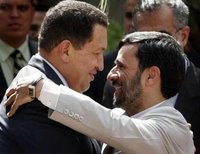
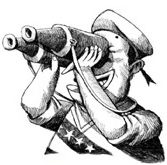
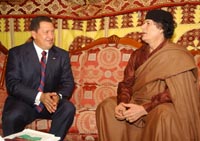
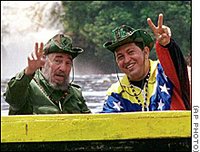
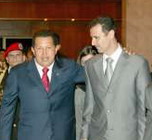
 Site feed
Site feed 